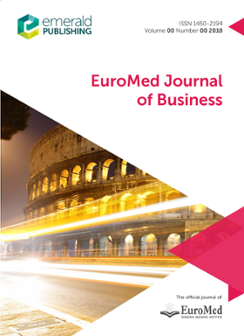避税对油气企业社会责任和股价波动的调节作用
IF 3.9
Q2 BUSINESS
引用次数: 0
摘要
本研究考察了企业社会责任对油气公司股价波动的影响,并确定了避税的调节作用。为了实现研究目的,从2010年至2020年期间从30家石油和天然气公司提取了330个观测值,并使用了广义最小二乘法(GLS)的估计方法。实际上,企业社会责任是用ESG(环境、社会和治理)评分来衡量的,而股价波动是用过去52周的股价在12个月内的波动程度来衡量的。研究发现,企业社会责任对股价波动有负向影响。尽管如此,这种负向关系被避税正向调节。该结果对波动率的变化,即系统风险的变化具有鲁棒性。本文强调了可持续发展对降低金融风险的重要性,对投资者管理投资组合风险有一定的帮助。本研究还有助于监管机构和政策制定者(如环境机构和税务机关)重新评估其对油气公司的控制,并根据其企业社会责任实践进行记录,因为本文强调同时纳税和从事企业社会责任实践是不公平的。企业社会责任对股价波动的影响被广泛地研究。然而,可能影响这种关系的机制仍然很少被讨论。本研究试图检验避税对油气行业csr -股价波动关系的影响。本文章由计算机程序翻译,如有差异,请以英文原文为准。
The moderating role of tax avoidance on CSR and stock price volatility for oil and gas firms
Purpose This study examines the impact of CSR (corporate social responsibility) on stock price volatility of oil and gas firms and, then identifies the moderating role of tax avoidance. Design/methodology/approach To achieve the study's purposes, 330 observations are extracted from 30 oil and gas firms for the period between 2010 and 2020, and the estimation method of the Generalized Least Squares (GLS) is used. Actually, the CSR is proxied using the ESG (environmental, social, and governance) score, and the stock price volatility is measured by the degree of stock price variations over 12 months, according to the last 52 week's price. Findings The main findings indicate that CSR negatively impacts the stock price volatility. Nonetheless, this negative relationship is moderated positively by tax avoidance. This result is robust to the variation in the measure of volatility, namely the systematic risk. Practical implications This research is helpful for investors to manage their portfolio risk as this article highlights the importance of engaging in sustainable development to reduce financial risk. This study also helps regulators and policymakers, such as environmental agencies and tax authorities, to reassess their control with oil and gas firms and record them according to their CSR practices, because this article emphasizes that it is not fair to pay taxes and engage in CSR practices at the same time. Originality/value The impact of CSR on stock price volatility is widely treated for firms. Nevertheless, the mechanisms that may affect this relationship are still seldom discussed. This study attempts to examine the impact of tax avoidance on the CSR–stock price volatility relationship for the oil and gas industry.
求助全文
通过发布文献求助,成功后即可免费获取论文全文。
去求助
来源期刊

EuroMed Journal of Business
BUSINESS-
CiteScore
9.80
自引率
19.20%
发文量
61
期刊介绍:
The EuroMed Journal of Business (EMJB) is the premier publication facilitating dialogue among researchers from Europe and the Mediterranean. It plays a vital role in generating and disseminating knowledge about various business environments and trends in this region. By offering an up-to-date overview of emerging business practices in specific countries, EMJB serves as a valuable resource for its readers.
As the official journal of the EuroMed Academy of Business, EMJB is committed to reflecting the economic growth seen in the European-Mediterranean region. It aims to be a focused and targeted business journal, highlighting environmental opportunities, threats, and marketplace developments in the area. Through its efforts, EMJB promotes collaboration and open dialogue among diverse research cultures and practices.
EMJB serves as a platform for debating and disseminating research findings, new research areas and techniques, conceptual developments, and practical applications across various business segments. It seeks to provide a forum for discussing new ideas in business, including theory, practice, and the issues that arise within the field.
 求助内容:
求助内容: 应助结果提醒方式:
应助结果提醒方式:


